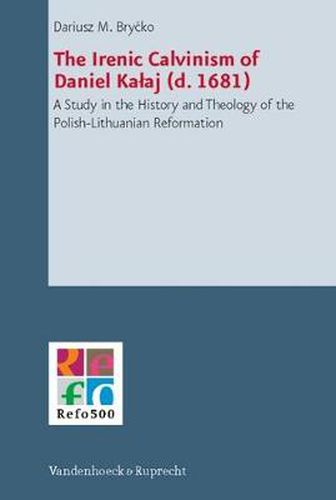Readings Newsletter
Become a Readings Member to make your shopping experience even easier.
Sign in or sign up for free!
You’re not far away from qualifying for FREE standard shipping within Australia
You’ve qualified for FREE standard shipping within Australia
The cart is loading…






Daniel Kalaj (d.1681) was a Polish Reformer of Hungarian background, born in Little Poland (Malopolska) and trained in Franeker, Friesland, under some of the most brilliant Reformed theologians of seventeenth-century Europe, such as Cocceius and Cloppenburgh. Kalaj’s ministry in the Reformed Church of Little Poland was abruptly interrupted when Catholic authorities wrongly accused him of spreading then-outlawed Arianism, calling him a Calvinoarian. Kalaj became the first Polish Protestant minister to receive a sentence of capital punishment as a result of the new anti-toleration law issued in 1658 against Arians, under the false pretext of military treason during the Second Northern War (1655-1660). He escaped the axe by fleeing to Lithuania (and later to Gdansk), where he wrote his best-known work A Friendly Dialogue between an Evangelical Minister and a Roman Catholic Priest . The Friendly Dialogue is both: Kalaj’s own personal defense and a compendium to Polish Reformed doctrine, and has a strongly irenic disposition. In contrast with many Reformed thinkers of his day, Kalaj is capable of communicating Reformed doctrine in a friendly and peaceful manner. He places special emphasis on the unity of the catholic church, as expressed in his statement that the three churches Roman, and Lutheran, and Reformed are all part of one true church before God, while at the same time attempting to retain his Reformed orthodoxy.
$9.00 standard shipping within Australia
FREE standard shipping within Australia for orders over $100.00
Express & International shipping calculated at checkout
Stock availability can be subject to change without notice. We recommend calling the shop or contacting our online team to check availability of low stock items. Please see our Shopping Online page for more details.
Daniel Kalaj (d.1681) was a Polish Reformer of Hungarian background, born in Little Poland (Malopolska) and trained in Franeker, Friesland, under some of the most brilliant Reformed theologians of seventeenth-century Europe, such as Cocceius and Cloppenburgh. Kalaj’s ministry in the Reformed Church of Little Poland was abruptly interrupted when Catholic authorities wrongly accused him of spreading then-outlawed Arianism, calling him a Calvinoarian. Kalaj became the first Polish Protestant minister to receive a sentence of capital punishment as a result of the new anti-toleration law issued in 1658 against Arians, under the false pretext of military treason during the Second Northern War (1655-1660). He escaped the axe by fleeing to Lithuania (and later to Gdansk), where he wrote his best-known work A Friendly Dialogue between an Evangelical Minister and a Roman Catholic Priest . The Friendly Dialogue is both: Kalaj’s own personal defense and a compendium to Polish Reformed doctrine, and has a strongly irenic disposition. In contrast with many Reformed thinkers of his day, Kalaj is capable of communicating Reformed doctrine in a friendly and peaceful manner. He places special emphasis on the unity of the catholic church, as expressed in his statement that the three churches Roman, and Lutheran, and Reformed are all part of one true church before God, while at the same time attempting to retain his Reformed orthodoxy.